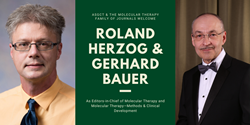
“It is important to understand that the Molecular Therapy family of journals offers unprecedented opportunities to publish high-quality articles in gene and cell therapy,” Herzog says.
MILWAUKEE (PRWEB)
November 25, 2019
The American Society of Gene & Cell Therapy (ASGCT) announced today the appointment of Roland W. Herzog, Ph.D. and Gerhard Bauer as editors-in-chief of the Society’s field-leading journals, Molecular Therapy and Molecular Therapy—Methods & Clinical Development, respectively. Both editors will begin their positions effective January 1, 2020.
Herzog, currently the editor-in-chief of Molecular Therapy—Methods & Clinical Development, will assume the same role for a five-year term at Molecular Therapy from Seppo Ylä-Herttuala, M.D., Ph.D. at the conclusion of Ylä-Herttuala’s term. Herzog is also a professor of pediatrics, Riley Children’s Foundation Professor of Immunology, and director of the gene and cell therapy program at Indiana University.
“It is important to understand that the Molecular Therapy family of journals offers unprecedented opportunities to publish high-quality articles in gene and cell therapy,” Herzog says. “My vision has continued and even further strengthened close coordination and collaboration between the journal editors and partnership with Cell Press and ASGCT.”
Bauer replaces Herzog at the helm of Molecular Therapy—Methods & Clinical Development after serving as an associate editor of the same journal for more than four years. Bauer is an assistant professor of hematology and oncology and director of the Good Manufacturing Practice (GMP) laboratory at the UC Davis Institute for Regenerative Cures.
“Over the years that I have been looking at manuscripts submitted to the journal, I have always loved the articles dealing with translational research, getting the products ready for clinical applications, improving their utility and solving problems in the manufacturing of these products,” Bauer says. “Now, at a time where we have clinical efficacy and also commercially approved cell and gene therapy products that save lives, it is even more important to strengthen the translational research field.”
ASGCT’s official journal, Molecular Therapy is the leading journal for research in the areas of gene transfer, vector development and design, stem cell manipulation, development of gene-, peptide-, protein-, oligonucleotide-, and cell-based therapeutics to correct genetic and acquired diseases, vaccine development, pre-clinical target validation, safety/efficacy studies, and clinical trials. Molecular Therapy is dedicated to promoting the sciences in genetics, medicine, and biotechnology. Publishing important peer-reviewed research and cutting-edge reviews and commentaries, the journal continues to attract the best material in the field. Molecular Therapy’s 2018 impact factor is 8.402.
The aim of Molecular Therapy—Methods & Clinical Development is to build upon the success of Molecular Therapy in publishing important peer-reviewed methods and procedures, as well as translational advances in the broad array of fields under the molecular therapy umbrella. Molecular Therapy—Methods & Clinical Development’s 2018 impact factor is 4.875.
In addition to Molecular Therapy and Molecular Therapy Methods & Clinical Development, ASGCT also owns and operates two other sibling journals, Molecular Therapy—Nucleic Acids (2018 impact factor 5.919) and Molecular Therapy—Oncolytics (2018 impact factor 5.710).
About ASGCT
The American Society of Gene & Cell Therapy is the primary professional membership organization for scientists, physicians, patient advocates, and other professionals with interest in gene and cell therapy. Our members work in a wide range of settings including universities, hospitals, government agencies, foundations, biotechnology and pharmaceutical companies. ASGCT advances knowledge, awareness, and education leading to the discovery and clinical application of gene and cell therapies to alleviate human disease to benefit patients and society.
Share article on social media or email:

